I've been rereading one of my favorite novels the last couple of weeks and I've found that it has taken on a whole new feeling for me. The book is The Riddle of the Sands by Erskine Childers. I've read my old paperback copy of the book probably three or four times since I bought it in the mid-80's (the price marked on the book is "USA $3.95"). Not only is it a classic spy novel, but it is a great book about sailing a small boat in shallow coastal waters.

The story involves a minor official in the foreign office, Carruthers, being invited to join a brief acquaintance, Davies, on a sailing vacation in the German Frisian Islands, a coastal group of islands on the eastern edge of the North Sea. Between the islands and the mainland are sand flats that are navigable at high tide but exposed at low tide. The "Riddle" of the book involves navigating those waters/sand flats by the English spies and their German pursuers. It is a great read.
This book, which takes places in 1903, was written as a warning about a possible war with Germany. The fact that the author, a British patriot, died in front of a British firing squad only makes the book more interesting. I've read that Erskine Childers was a sailor and that some of the sailing passages in the book were taken directly from his sailing logs. Reading them now I can easily believe that his writings are based on personal experience.
I guess the book feels different to me now because I've spent some time sailing in the shallow waters of coastal North Carolina. No, the tides are not extreme in Pamlico and Core Sounds like in the Frisian Islands. But there is plenty of shallow water and it is well worth paying attention to tides, shoals and sand bars. Childers' description of shallow water sailing rings very true.
The other thing that rings very true in the book is the experience of a non-sailor (read Carruthers or Bruce) joining a somewhat absent minded sailor (read Davies or Steve) on a small boat adventure. There are a lot of passages in the book that remind me of the experiences Bruce and I've had sailing Spartina the last few years.
"It's quite a small boat, you know - I (Davies, read Steve) hope you didn't expect luxury. I've managed her single-handed for some time. A man would be no use, and a horrible nuisance." He revealed these appalling truths with a cheerful assurance, which did nothing to hide a naive apprehension of their affect on me (Carruthers/Bruce)."
Bruce did know, since he had watched the building of Spartina from a distance, what he was getting into. But when he did arrive for the first cruise he spent a long time looking at the boat, asking questions like "What if it rains?" or "if we are out of the boat how do we get back in?" and that sort of thing.
"I (Carruthers, read Bruce) knelt in a tangle of line and, under the hazy impression that something very critical was going on, plied the lead furiously, bumping and splashing myself, and shouting out the depths, which lessened steadily, with a great sense of the importance of my function. Davies (read Steve) never seemed to listen, but tacked on imperturbably, juggling with the tiller, the sheets and the chart."
This is very reminiscent of our last cruise in the shallow waters of Core Sound. Bruce did not use a lead line, but instead his gps. He was watching the charts calling out the depths as we sailed. He told me at one point he thought I was ignoring him because I sailed straight at some shoals. This was a failure in communication on my part. I was taking his information into account, but I was also looking at the surface of the water, the color, and a few other factors. The information he provided was invaluable, I just never let him know that it was just one of the factors in making the sailing decisions.
or, when the boat runs up on a shoal......
"Like most landsmen I (Carruthers, read Bruce) had a wholesome prejudice against "running aground", so that my mentor's turn for breezy paradox was at first rather exasperating."
This reminds me of our second cruise together, the SkeeterBeater. On the first day we had to tack into the wind down Far Creek from Englehard to Pamlico Sound. We must have hit bottom four or five time. I didn't see it as a big deal, I had been running aground for years. But Bruce pointed out that he wasn't sure "The Captain" knew what he was doing.
And on occasion Bruce has taken the chance to voice to others, including both of our wives, the rough aspect of sailing on an open boat. Carruthers did the same...
"not without a secret zest, drew a lurid picture of the horrors of crewless cruising, and the drudgery that my remorseless skipper (read Steve) inflicted on me (read Bruce). It was delightful to see Davies (Steve) wincing when I described my first night....."
And more than once Bruce has questioned the speed at which we travelled, just like Carruthers....
"Can't we go any faster?" I (Carruthers/Bruce) burst out once. I felt that there ought to be a pyramid of gauzy canvas along, spinnakers, flying jibs and what not."
Or, as Bruce has suggested, couldn't we use the outboard?
Or....
"his (Davies/Steve) left hand behind him on the tiller, his right forefinger on a small square of paper which lay on his knees......On the midship-thwart between us lay the compass and a watch. Between these three objects - compass, watch and chart - his eyes darted constantly, never looking up or out, save occasionally for a sharp glance over the side at the flying bubbles, to see if I (Carruthers/Bruce) was sustaining a regular speed. My duty was to be his automaton, the human equivalent of a marine engine..."
Yes, I confess, I've asked Bruce to do more than a few things without explaining why. "Just take my word for it," you know. But I'm thinking about this, wondering about that and find myself telling Bruce just do this or that and don't bother asking why!
A book written in 1903 and it rings very true today. The good news is there was a happy ending to the book (and all our cruises). If you like books about sailing or spies then you ought to check this one out.
And finally, I titled this post "a pencil thin mustache" in honor of Gloria Winters who passed away a couple of weeks ago. She portrayed Sky King's niece Penny on the television show "Sky King" back in the 1950's. I remember watching the show on the old black and white tv (they must have been reruns in the early 60's that I watched) in my Mom's sewing room. Sky King was a rancher/pilot that solved all sorts of mysteries out in the southwest. Penny was immortalized by Jimmy Buffett in his tribute to growing up in the 50's and 60's, Pencil Thin Mustache, where he relived the glories of Andy Devine, Ricky Ricardo, American Bandstand, Disneyland and happy endings.
"I remember being buck-toothed and skinny
Writing fan letters to Sky King's niece Penny
Oh I wish I had a pencil thin mustache
Then I could solve some mysteries too"
Forecast is good for tomorrow, lunch packed and Spartina ready to go.
steve















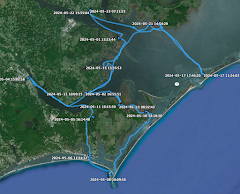
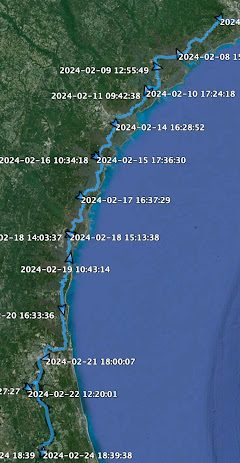

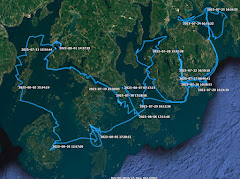

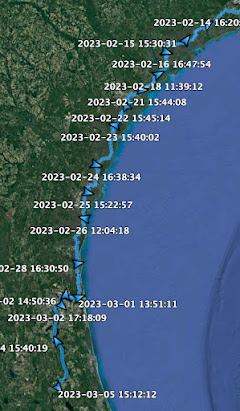

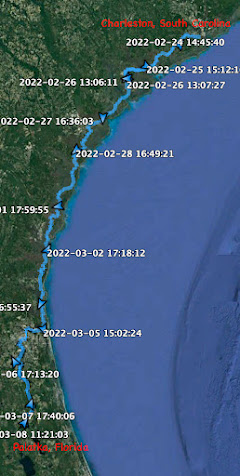
























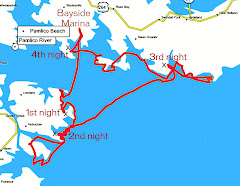


2 comments:
Great post, Steve. Really enjoyed that.
Barry,
did you get a boat down to South Carolina on the family visit?
steve
Post a Comment